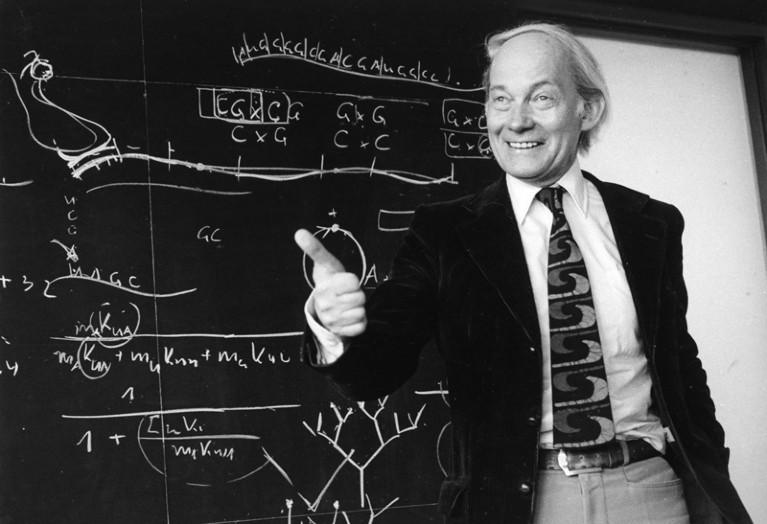
Manfred Eigen at a lecture in 1979.Credit: Blachian/Max Planck Society
Chemist Manfred Eigen regarded received wisdom as a challenge rather than a constraint. His techniques for investigating ‘immeasurably fast’ reactions and their application to biological systems opened up new avenues, in fields from fundamental kinetics to the formation of protein complexes. This work, conducted in the 1950s at the Max Planck Institute (MPI) for Physical Chemistry in Göttingen, won him a share (with Ronald Norrish and George Porter) of the 1967 Nobel Prize in Chemistry. He went on to develop theories to account for the self-organization of biological molecules, and he was a creator of the new field of evolutionary biotechnology.
At a time when most institutes and departments were split along disciplinary lines, Eigen argued that understanding organisms at the level of their chemical interactions demanded an interdisciplinary approach. After years of lobbying, he got his wish in 1971, when the Max Planck Society (MPS) created the MPI for Biophysical Chemistry in Göttingen. ‘It is not the research area that counts,’ ran the founding principle of the laboratory: ‘it is the excellence of the individuals’. He was less successful at persuading the MPS to found a institute for science and music.
Eigen was born in Bochum, Germany, where his father was a cellist. By 15, he was himself a proficient pianist with the potential for a future solo career. He’d also developed an interest in chemistry, doing experiments in a lab at home. But, in 1942, as allied bombers began to shift the balance against Germany in the Second World War, his class was drafted to the anti-aircraft batteries defending the city; two years later, he was conscripted into the German air force.
When Germany surrendered in May 1945, 2 days before his 18th birthday, Eigen was stationed at Salzburg airport in Austria, which was occupied by US troops. Captured as prisoners of war, Eigen and a friend managed to escape, and walked roughly 1,000 kilometres back to Bochum over the next month. Having not touched a piano for three years, he decided to make his career in science. The University of Göttingen accepted him as a student of geophysics — the only branch of physics with room for him, when so many older students were returning from military service. He studied with some of the country’s leading physicists, including Nobel prizewinners Werner Heisenberg and Wolfgang Paul.
In 1953, after a doctorate on the specific heat of heavy water, Eigen moved to the recently founded MPI for Physical Chemistry to work with its director, Karl Friedrich Bonhoeffer. In a standard textbook co-authored by his former supervisor, Arnold Eucken, Eigen found reactions described as “immeasurably fast”. Refusing to accept such uncertainty, by 1954, he had developed a way of disturbing the equilibria in chemical solutions with pulses of intense electrical or ultrasonic energy, and using spectroscopy to time how long it took for equilibrium to be restored. Such ‘relaxation techniques’ could determine the rate of a neutralization reaction that took place in nanoseconds — orders of magnitude faster than any previously measured.
His success made it possible for scientists to study reactions catalysed by enzymes that drive all processes of life. Eigen developed concepts to explain how replicating macromolecules on the prebiotic Earth might have evolved into replicating organisms. In 1971, for example, he posed the paradox that without error-correction enzymes, the length of a nucleic acid would be limited because, in larger molecules, mutations would destroy the information content of subsequent generations. But this maximum size (or error threshold) was too small to encode an error-correcting enzyme. Eigen’s paradox still challenges theoretical biologists.
From the early 1980s, he developed these concepts into evolutionary biotechnology at the MPI. His colleagues built ‘evolution reactors’ that drove the evolution of viruses and other replicating molecules under controlled conditions to investigate how pathogens evade the immune system, or to search for new drugs. Eigen helped to found two companies to exploit this technology, Evotec Biosystems (now Evotec AG) and DIREVO Biotech (bought by Bayer Healthcare in 2008).
Although he oversaw the design and location of the MPI for Biophysical Chemistry, Eigen declined the post of permanent director, instead heading its Department of Biochemical Kinetics until he retired in 1995. “His way of solving problems with the best factual and transparent solution instead of imposing his unquestioned authority shaped the spirit of the institute,” wrote MPI colleagues in an article celebrating Eigen in his 90th year (H. Jäckle et al. Eur. Biophys. J. 47, 319–323; 2018). Eigen remained active after retirement, dividing his time between Göttingen and the Scripps Research Institute in La Jolla, California.
Communication with the wider public was important to him. He published three books aimed at the general reader: Laws of the Game (1983), Steps Towards Life (1992) and From Strange Simplicity to Complex Familarity (2013). All were written jointly with his long-standing scientific partner, Ruthild Winkler-Oswatitsch, who became his second wife.
He chaired the council of Europe’s life-sciences organization EMBO through delicate negotiations to establish a base in Heidelberg in the early 1970s. And in his 12 years presiding over the German Academic Fellowship Foundation, he pushed for the advancement of young scientists through doctoral grants. He remained an impressive amateur pianist, sometimes playing Mozart’s concertos after scientific meetings. A man of great personal elegance, with a taste for striking ties, his quest for elegant solutions widened the field of view for generations of researchers that followed.

 Physics Nobel won by laser wizardry — laureates include first woman in 55 years
Physics Nobel won by laser wizardry — laureates include first woman in 55 years








